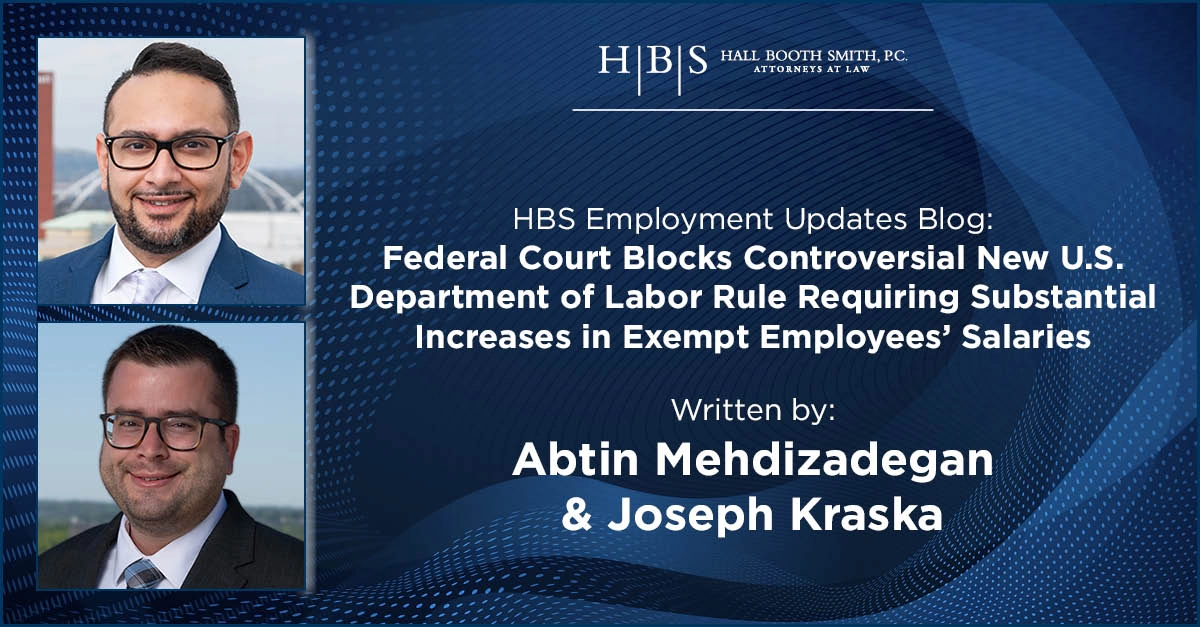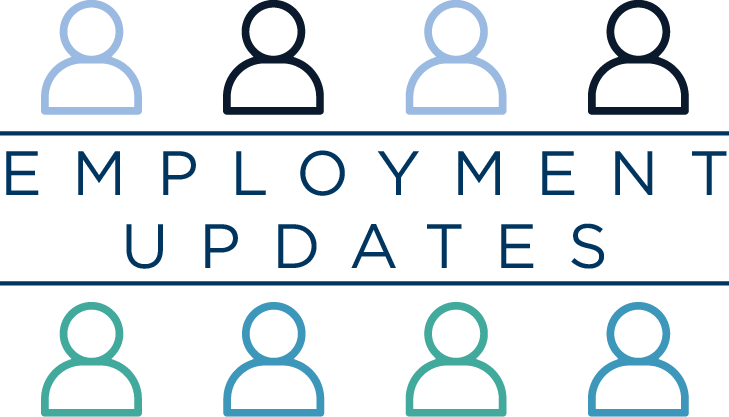
Federal Court Blocks Controversial New U.S. Department of Labor Rule Requiring Substantial Increases in Exempt Employees’ Salaries
On November 15, 2024, in a significant ruling that will impact employers across the nation, the U.S. District Court for the Eastern District of Texas struck down the U.S. Department of Labor’s (DOL) new rule that would have required employers to increase the salary-basis threshold under the Fair Labor Standards Act (FLSA). In light of the injunction, employees who otherwise satisfy the so-called “white collar” exemptions’ duties and payment requirements will remain “exempt” from the FLSA’s overtime requirements so long as they earn $35,568 per year.
Background
On April 23, 2024, DOL issued a final rule, Defining and Delimiting the Exemptions for Executive, Administrative, Professional, Outside Sales, and Computer Employees, that required employers to increase the salary threshold in order to maintain that exempt status. The first change became effective on July 1, 2024, and required employers to increase the salary threshold from $35,568 to $43,888 per year. The second change, which would have increased the salary threshold to $58,656, was set to go into effect as of January 1, 2025. Likewise, DOL’s new rule increased the salary threshold for the “highly compensated” exemption, and it permitted employers to provide for catch-up payments of up to 10% at the end of the year in the event an employee’s earnings fell below the requisite threshold. The final key change under DOL’s new rule involved automatic increases in the salary threshold amount every three years based on the consumer price index, without any notice or comment period.
DOL estimated that these changes would result in employers reclassifying millions of employees as nonexempt, requiring employers to either pay overtime or adjust work schedules to avoid increased costs.
The Court’s Decision
Soon after DOL published its final rule, several lawsuits proceeded. One lawsuit claimed that because the increase to the salary threshold was so high, more than 4 million individuals would be denied exempt status, even though these individuals could reasonably be classified as exempt based on their extant duties.
In Texas, the court initially granted a limited injunction, preventing the final rule from becoming effective as to only public employers in Texas. On November 15, 2024, in a sixty-two-page written opinion, the Court found the 2024 Rule to be an unlawful exercise of agency power, granting summary judgment and enjoining the final regulation on a nationwide basis. The Court’s decision was predicated on issues of statutory interpretation and administrative procedure.
In reaching this outcome, the Court emphasized that the FLSA’s white collar exemptions focus on an employee’s duties, not their salary. By significantly raising the salary threshold and making it the predominant factor in determining exemption, the Court held that DOL effectively displaced the statutory duties-based test outlined in the FLSA. The Court also highlighted the substantial financial burden the rule would impose on employers, particularly small businesses and state governments, estimating Year 1 costs of $2.7 billion nationwide. And unsurprisingly—because DOL attempted the same automatic updating process unsuccessfully during the waning months of the Obama administration—the Court held that the provision for automatic increases to the salary threshold amount based on the consumer price index was inconsistent with Congressional intent, as it circumvented the required regulatory process that provides the Secretary of Labor with authority to promulgate increases to the salary threshold.
What This Means for Employers
This ruling is a welcome respite for employers who continue roiling from increased labor costs following a period of high inflation, but the timing is unfortunate because employers have already devoted countless hours to begin preparing for the final rule’s implementation. This will require employers to reconsider their approaches and budgets for 2025.
First, and at a minimum, employers should continue applying the 2019 salary threshold ($684 per week) when evaluating whether an employee satisfies the white collar exemptions.
Second, because many employers already increased the salary threshold amount in July 2024 (or otherwise reclassified positions as non-exempt), employers and HR professionals should reevaluate their current employee census to determine whether to (1) decrease salaries while maintaining exempt status; (2) maintain salaries consistent with the July 1, 2024 increases; (3) reclassify positions as exempt if they were transitioned to non-exempt; and, among other things, (4) consider whether and to what extent some employees’ salaries should be increased in some amount to assist with recruitment and retention. Without question, if an employee received an increase in July 2024 and was told about another required regulatory raise in 2025, lowering their pay now will doubtless create morale issues.
Third, even with this ruling, the scrutiny of overtime classifications is intensifying. Employers should ensure their classification practices align with both duties and salary tests under existing FLSA standards.
Finally, as this case evolves, Hall Booth Smith’s Employment Practices Group will continue monitoring developments and provide timely updates to help businesses navigate the complexities of labor and employment law. The Supreme Court has expressed at least some concern with the practice of federal district courts granting nationwide injunctions, and it is possible for the intermediate appellate court (the Fifth Circuit) to reverse the district court on any number of grounds. If this ruling is reversed, then DOL’s final rule would become effective almost immediately. HR professionals must continue monitoring this litigation for any updates.
For more information or to discuss your organization’s compliance strategy, please contact Abtin Mehdizadegan or Joseph Kraska.
Disclaimer
This material is provided for informational purposes only. It is not intended to constitute legal advice nor does it create a client-lawyer relationship between Hall Booth Smith, P.C. and any recipient. Recipients should consult with counsel before taking any actions based on the information contained within this material. This material may be considered attorney advertising in some jurisdictions. Prior results do not guarantee a similar outcome.
Blog Overview
About the Author
Abtin Mehdizadegan
Partner | Little Rock Office
T: 501.503.4445
E: abtin@hallboothsmith.com
Abtin Mehdizadegan is a Partner in our Little Rock, Arkansas, office and represents employers in traditional labor and employment law matters. He has extensive, high-stakes experience defending businesses in class and collective action lawsuits, employment and wage and hour lawsuits, labor grievance and arbitration proceedings, individual and systemic proceedings before the Equal Employment Opportunity Commission (EEOC), unfair labor practice charges before the National Labor Relations Board (NLRB), federal wage and hour audits involving the Department of Labor’s Wage and Hour Division (DOL/WHD), unemployment appeals, business disputes, products liability defense, and constitutional law litigation.
Joseph M. Kraska
Attorney at Law | Little Rock Office
T: 501.435.3205
E: jkraska@hallboothsmith.com
Joseph M. Kraska specializes in labor and employment matters. He has represented clients in collective bargaining, RC petitions, unfair labor practice charges, labor arbitrations, OSHA compliance matters, and federal and state employment discrimination matters, and he provided general employment advice.





Leave a comment
You must be logged in to post a comment.